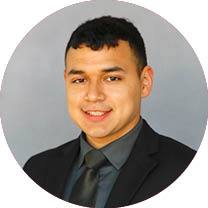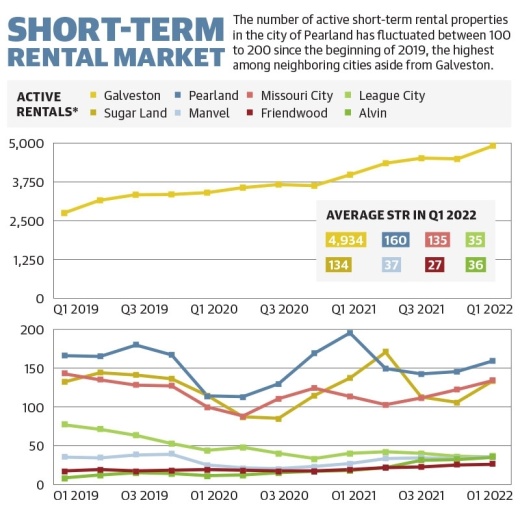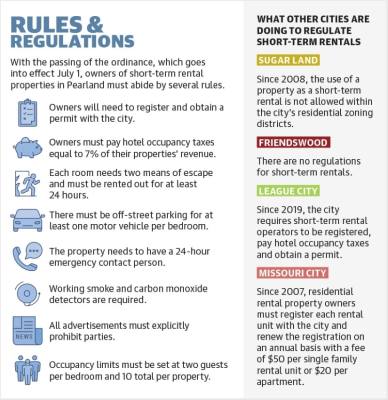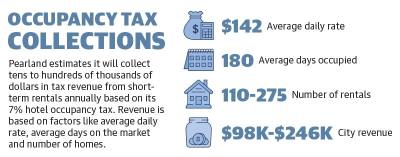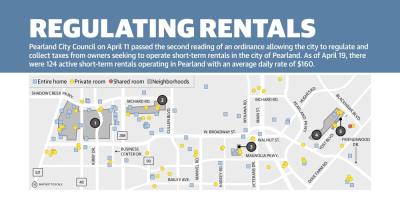Pearland City Council at its April 11 meeting passed an ordinance establishing requirements and regulations to operate short-term rentals within city limits. The ordinance is the culmination of an odyssey among residents, council members and city staff.
City officials said they hope the ordinance gives the city more flexibility in controlling disturbances, such as complaints raised by Pearland residents for parking and noise issues, in neighborhoods throughout the city.
“This ordinance ... itself is not going to stop a party from happening, ... but it does give us some recourse in the event if it does,” Pearland Mayor Kevin Cole said.
With the ordinance’s effective date set for July 1, city staff will work on how to implement it, including working on the online permit process, figuring out what is a violation and developing an information page on the city’s website, said Tracy Rohrbacher, Pearland Convention and Visitors Bureau executive director.
As of April 19, there were 124 active rentals in the city of Pearland, according to data from AirDNA, an analytics company that tracks short-term rental properties worldwide. The platform considers a property an active rental if it has had at least one reserved or available day in the past month.
“This is going to be imperfect,” Council Member Alex Kamkar said of the ordinance. “Our ordinances were not prepared to have a business in a residential area that is high volume, and we are having to evolve with society.”
Road to regulation
City Council on Oct. 11 passed a resolution establishing a committee tasked with evaluating regulatory options, such as permitting, inspection and occupancy requirements.
Council on Oct. 25 then passed an ordinance creating a requirement for a registration program to operate short-term rentals within the city along with a requirement to pay hotel occupancy taxes to the city.
“Airbnbs are for the vacation life,” Pearland resident Melissa Flores said during citizen comment at the Oct. 11 meeting. “People arrive at all times of the day and night.”
The committee in early December brought a list of recommendations that eventually served as the outline for the ordinance council adopted April 11. Council held a public drafting of the ordinance in February where members gave their input on what should be included in the ordinance.
City staff also used previous court cases as guides to crafting an ordinance that is both within the city’s legal authority and effective at regulating short-term rentals.
Under the ordinance, the city can regulate short-term rentals in four phases: permit applications, inspection requirements, restrictions, and permit denial or revocation, Pearland City Attorney Darrin Coker said.
The city will also collect 7% of all revenue from short-term rentals through the hotel occupancy tax. The tax is collected from hoteliers and used to market Pearland to generate overnight stays, according to the PCVB.The number of short-term rental properties has increased 41.6% since mid-2020 from an average of 113 properties per quarter to an average of 160 in the first three months of 2022. The ordinance will regulate short-term rental properties on platforms such as Airbnb, which makes up about 85% of the short-term rentals in Pearland, according to AirDNA.
Some regulations in place through the ordinance include occupancy limits to two adults per room and 10 total per property. Additionally, each room needs to have two means of escape, like a door and window; working smoke and carbon monoxide detectors. All advertisements must explicitly say parties are prohibited at the property.
Airbnb Public Policy Manager Luis Briones said in an email Airbnb favors Pearland’s regulations.
“This is a fair ordinance that balances regulation with empowering our local host community to continue earning meaningful additional income and responsibly bringing important tourism dollars to the city,” Briones said.
Ordinance concerns
Throughout the ordinance process, Pearland residents spoke during City Council meetings about concerns happening in their local neighborhoods, one of which was about a property being used as a short-term rental on Verona Drive in east Pearland.
Some concerns by the residents in the subdivision range from parking disturbances, like blocking neighbors’ driveways, to parties and recording video shoots on the property.
“We have been held hostage [for] more than three years,” said Randy Bailey, a neighbor of the Verona Drive property, at the April 11 meeting.
William Wiatrak, the owner of the Verona Drive property, said the accusations made against him and the property are false.
“They are using me as a poster boy,” he said.
While the Verona Drive house is rented out on Airbnb with various themed rooms, like a jail and Egyptian room, Wiatrak said the complaints from neighbors stem from renting out the property on a different platform: Peerspace.Peerspace allows people to book spaces for events and productions, according to the platform’s website.
Wiatrak was renting out the property for certain time windows to artists, who shot music videos at his house, which began the conflict, he said. He denied renting out his house for parties and he said he has stopped renting out the property for videos.
Throughout the crafting of the ordinance, several members on City Council referenced the property as reasons for the need of a regulation on short-term rentals. The ordinance requires any short-term rental in the city to be rented out for a minimum of 24 hours.
While the ordinance passed by City Council does not stop Wiatrak from renting out his property as an Airbnb, he said he is discouraged from continuing to operate it with the regulations in place because of how much he has been targeted.
There have been other concerns raised on the specific regulations beyond one property. Council Member Luke Orlando, who voted against the ordinance during both the first and second readings, said the regulations could hurt residents who seek to make additional income from their homes.
Council Member Adrian Hernandez also voted against the ordinance during the second reading because the ad hoc committee created to bring suggestions on regulations lacked input from short-term rental owners, he said.
“Fundamentally, I think this is taking a sledgehammer to an issue that requires a scalpel,” Orlando said.
Tax to operate
Once the ordinance goes into effect July 1, Pearland will use an online software platform, LODGINGRevs, to identify properties that have an active permit to operate a short-term rental location.Through LODGINGRevs, Pearland will see properties with an active short-term rental listing on sites like Airbnb or Vrbo. If a property does not have a permit, the owner will be given a chance to get one, and if they do not, then a case could be filed with the Pearland Municipal Court and lead to fines up to $500, Rohrbacher said.
While the effects the regulations will have are unclear, the permit process will allow the city to understand where short-term rental properties are located and how guests choosing short-term rentals for visits are affected, Rohrbacher said.
Pearland expects to collect $98,406 to $246,015 from the 7% hotel occupancy tax, assuming the average daily rate for a rental is $142 and that they are occupied for at least 180 days of the year, according to city officials.
In the past five fiscal years, Pearland collected between $994,018 to $1.6 million per year in hotel occupancy tax revenue, according to data provided by the PCVB. Based on Pearland’s projected collections of hotel tax revenue from short-term rentals, the city could collect an additional 7.94% to 19.84% of revenue in tax compared to the 1.24 million in revenue collected on hotel occupancy taxes in FY 2021, which ended on Sept. 30, 2021.
“This is in competition with the hotel people, so anything that they have that are penalties for them or things that they have to do in the hotels, I think it should be the same with a short-term rental,” Council Member Woody Owens said.


